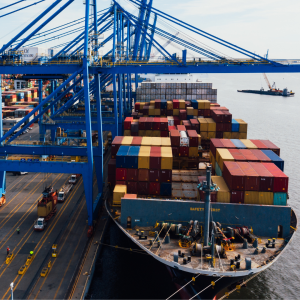
Supply chain disruptions in an increasingly interconnected global economy pose significant business challenges. From unexpected geopolitical events to natural disasters and pandemic-related shutdowns, disruptions can cripple the supply chains industry, affecting everything from production timelines to customer satisfaction. Adopting adaptable digital solutions, including digital freight forwarding, freight technology, and logistics management tools, is crucial for mitigating these challenges. By creating a responsive logistics network and leveraging advanced freight services shipping capabilities, businesses can maintain an efficient supply chain even during periods of uncertainty.
Challenges in the Supply Chains Industry
Global supply chains have grown in complexity over the last few decades, relying on a web of international logistics partners and intricate logistics networks. While this global integration enhances efficiency, it also exposes businesses to risks from supply chain disruptions. Natural disasters, political instability, pandemics, and cyberattacks are unpredictable factors that can severely impact freight transportation.
The Cost of Disruptions
Supply chain disruptions can have far-reaching effects, including delayed shipments, increased costs, and diminished customer trust. Efficient supply chain management is essential for minimizing these impacts, but achieving it often requires investing in adaptable digital solutions that streamline freight services, shipping, and logistics operations.
Digital Solutions for Navigating Supply Chain Disruptions
Digital solutions enable businesses to access real-time data and predictive analytics, transforming their approach to logistics management. Predictive analytics can identify potential bottlenecks or disruptions before they escalate, allowing logistics services to address issues proactively. By using a digital freight company platform, businesses can make data-driven decisions that improve the resilience of their supply chains.
Case Study Example
Consider a manufacturer reliant on international freight services to source critical components. By leveraging digital freight forwarding technology, the manufacturer can monitor global trade patterns and respond quickly to potential disruptions, such as port congestion or labor strikes.

Automated processes, such as robotic warehousing and freight booking, enhance efficiency and adaptability. Automation reduces human error, speeds up operations, and provides greater flexibility in adjusting logistics networks. When supply chain disruptions occur, automated freight services shipping systems can reroute shipments, adjust schedules, and minimize delays.
How Digital Freight Forwarding Transforms Logistics
Digital freight forwarding simplifies complex logistics processes by integrating multiple shipping options, tracking tools, and real-time communication. Unlike traditional models, digital platforms provide instant quotes, optimize routes, and facilitate seamless collaboration among freight transportation partners.
Benefits for International Freight Transportation
For businesses involved in international freight transportation, digital freight forwarding offers a centralized platform to manage documentation, customs compliance, and shipment tracking. This holistic approach reduces administrative burdens, expedites border crossings, and ensures on-time deliveries, even when facing unforeseen challenges.
Enhancing the Logistics Network with Freight Technology
The logistics network benefits from innovations like IoT sensors, GPS tracking, and AI-driven software solutions. IoT-enabled devices provide continuous visibility into cargo location and condition, helping logistics management teams detect issues such as temperature fluctuations in perishable shipments. AI-powered algorithms can analyze data to recommend optimized routes, minimizing costs and improving delivery times.
Flexibility in Transportation Freight Modes
Adaptable freight solutions emphasize flexibility in choosing transportation freight modes. During disruption, businesses can shift from one mode to another, such as switching from ocean to air freight to ensure timely deliveries. Digital platforms integrating multiple freight services provide the visibility and control needed to make these adjustments quickly.
Collaboration Across the Supply Chain
Collaboration is key to overcoming supply chain disruptions. Businesses can create a resilient logistics network capable of weathering disruptions by partnering with digital freight companies and international logistics providers. Sharing data and resources fosters a coordinated response, minimizing delays and cost overruns.
Leveraging Freight Services Shipping Platforms
Freight services shipping platforms facilitate collaboration by offering real-time communication channels, shared dashboards, and predictive insights. These tools allow stakeholders to align their strategies, reducing inefficiencies and enhancing supply chain performance.
Managing Supply Chain Disruptions with AI and Machine Learning
AI and machine learning applications can predict supply chain risks and offer actionable insights to mitigate them. For instance, AI can analyze historical data to anticipate disruptions caused by extreme weather, allowing businesses to reroute shipments in advance.
Optimizing Inventory Levels
Digital solutions help maintain optimal inventory levels, balancing the need for availability with cost control. Predictive analytics and real-time tracking enable logistics services to adjust inventory strategies dynamically, reducing the risk of stockouts or overstocking during disruptions.
Effective logistics management involves assessing risks and developing contingency plans. Businesses can establish mitigation strategies tailored to different scenarios by using data-driven tools to simulate potential disruptions.
Continuous Improvement Through Feedback Loops
Adaptable solutions allow businesses to continuously refine their logistics networks based on real-world performance. Digital platforms enable feedback loops that ensure companies learn from past disruptions and improve their response strategies over time.
Navigating supply chain disruptions requires an adaptable approach driven by digital solutions and collaborative efforts within the logistics network. Businesses can enhance their resilience and ensure an efficient supply chain by leveraging digital freight forwarding, automation, predictive analytics, and adaptable freight solutions. As global trade continues to evolve, staying agile and responsive will be key to overcoming disruptions and maintaining seamless operations in the supply chain industry.





Leave A Comment
You must be logged in to post a comment.